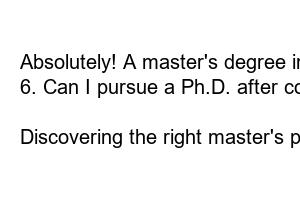스승 찾기
Title: Find a Master in English: Unlocking Opportunities for Language Enthusiasts
Introduction:
Embarking on a journey to find a master’s program in English can be both exciting and overwhelming. With so many options available globally, it’s essential to navigate through the diverse offerings and discover the perfect program that aligns with your interests and career goals.
1. Why Pursue a Master’s Degree in English?
A master’s degree in English opens up a world of possibilities, equipping you with advanced language skills, critical thinking abilities, and analytical expertise. The program delves deeper into literature, linguistics, and various areas of English studies, empowering students to become proficient communicators and versatile professionals in a range of industries.
2. Exploring Specializations in English Studies:
Within the realm of English studies, several specializations cater to distinct interests and career paths. From literature and creative writing to English education and technical communication, each specialization offers a unique learning experience. Whether you aspire to become a writer, educator, or language expert, identifying your passion will help you narrow down your options.
3. Factors to Consider When Choosing a Master’s Program:
When embarking on a search for the ideal master’s program in English, several factors come into play. Consider aspects such as the program’s reputation, faculty expertise, curriculum flexibility, and opportunities for research and internships. Moreover, factors such as location, cost, and availability of scholarships should also be taken into account.
4. How to Research and Shortlist Programs:
To find the perfect program, conduct thorough research and shortlist universities based on your preferences. Explore university websites, program curricula, faculty profiles, and student testimonials to gain insight into the quality of education and opportunities offered. Attend virtual information sessions, webinars, and online fairs to connect with program coordinators and clarify any queries you may have.
5. Navigating Application Requirements:
Each master’s program has its own set of application requirements, including transcripts, letters of recommendation, personal statements, and standardized test scores such as the GRE or TOEFL. It is crucial to thoroughly review these requirements, prepare all necessary documents in advance, and meet deadlines to ensure a smooth application process.
6. Funding Opportunities for Master’s Programs:
While pursuing a master’s degree in English is an invaluable investment, financial considerations are significant. Explore funding options, such as scholarships, grants, teaching assistantships, or research assistantships, that can alleviate the financial burden. Additionally, alternative forms of financial aid, like part-time jobs or student loans, can also offer additional support.
FAQs:
1. Can I pursue a master’s in English if my undergraduate degree is in a different field?
Yes, many programs welcome students from diverse academic backgrounds. Emphasize your passion for English studies and showcase transferable skills in your application to strengthen your candidacy.
2. Can I pursue a master’s in English online?
Certainly! Several universities offer online English master’s programs, providing flexibility for working professionals or those unable to attend classes in person.
3. Do I need to be a native English speaker to pursue an English master’s?
No, proficiency in English is essential, but it is not restricted to native speakers. Non-native speakers can demonstrate their language proficiency through standardized tests like the TOEFL or IELTS.
4. How long does it take to complete a master’s in English?
Typically, master’s programs in English take two years to complete if pursued full-time, although this can vary depending on the university and program structure.
5. Will a master’s in English enhance my career prospects?
Absolutely! A master’s degree in English equips you with not only advanced language skills but also critical thinking abilities and communication expertise, making you an asset in various professions such as writing, teaching, editing, and more.
6. Can I pursue a Ph.D. after completing a master’s in English?
Yes, a master’s degree in English is often a stepping stone towards a Ph.D. in English or related fields, providing a solid foundation for further advanced research and academic career opportunities.
Summary:
Discovering the right master’s program in English is an exciting endeavor. By exploring various specializations, considering program factors, conducting thorough research, and understanding the application process, you can embark on a transformative educational journey. With funding options available and excellent career prospects, a master’s degree in English can unlock a world of opportunities for language enthusiasts.

